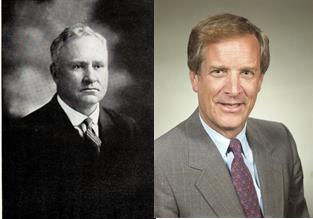Even though the semester has just gotten underway, we’ve got several collections nearing completion and will soon be ready for research. In fact, there are two collections that were made available just this month! Today we’ll take a look those collections and the two men who have left a lasting impact at Illinois State University.
Here’s a bit of trivia for you: Can you name the Illinois State Normal University professor who was also dean of the University and the mayor of Normal? This very busy and popular fellow was none other than Orson LeRoy Manchester, the namesake of Manchester Hall.
O.L. Manchester came from a family devoted to education. His father was a school superintendent, both at the county and city level. Manchester earned several degrees in career, his LL.D. being earned locally at Illinois Wesleyan University. Illinois State Normal University’s fourth president, John Cook, asked Manchester to be the principal for University High School, the University’s training school. A short time later, the high school was temporarily closed and Manchester became a professor for the university teaching economics and foreign language.
Manchester was well known and well respected both in the community and on campus. He sponsored student clubs and participated in local groups dedicated to bettering the community. Manchester was also known for his mathematical skill, using formulas to solve problems in the classroom and in town government. Read more about O.L. Manchester and see a list of his collected papers and writings by searching his finding aid.
We also recently completed the papers of Thomas P. Wallace, our 14th president. Wallace came into the presidency at a time when the state and the country were seeing financial stress. The late 1980s and early 1990s were a complete departure from the days of President Robert G. Bone—state funding was down and student enrollment had dramatically increased. The post World War II GI Bill era had all but ended and the University struggled to find ways to finance needed buildings and projects.
Wallace came to the presidency with an understanding that the University could no longer solely rely on state funding to keep the campus afloat. Alternative sources of funding were needed if the University were to move forward both structurally and academically. His ideas were not always welcome ones—his suggestion to fund the new laboratory science building with private funds was denied in favor of state financing. However, Wallace did bring advancements to the University, including a retooled tuition model, new approaches and ideas to external fundraising, and the installation of a fiber optic system across the campus. Learn more about Wallace, his presidency, and see what materials we have from his tenure by searching his finding aid.
As always, if you would like to see materials from these collections or any of our collection of university history, send us an email or give us a call at (309) 438-3546.

